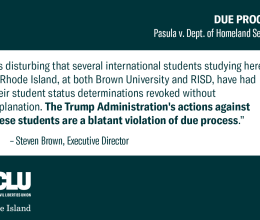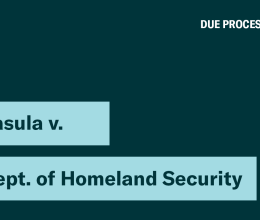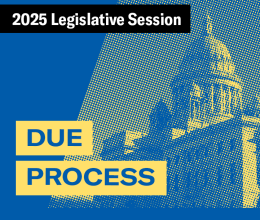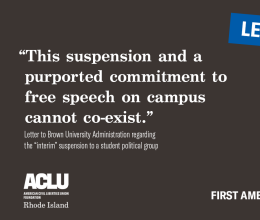The fallout from the rollout of UHIP, the state’s troubled new computer system, continues to plague Rhode Island’s poorest residents, as the Department of Human Services (DHS) showed virtually no improvement in April in the timely processing of SNAP (food stamp) applications, including for people the Department acknowledges were entitled to emergency relief. That is the upshot of a report sent by DHS this week to the ACLU of Rhode Island (ACLU) and the National Center for Law and Economic Justice (NCLEJ), required as part of a settlement agreement filed earlier this year in the organizations’ challenge to DHS’s failure to timely process SNAP applications.
In April, according to DHS’s report, more than 700 families who qualified for expedited benefits because of their emergency needs did not receive their benefits within 7 days of their application as required by law. Another 382 needy families who were entitled to receive benefits within 30 days not receive them on time. Percentage-wise, only 58% of the decisions on expedited (emergency) applications were made within the 7 days required by law last month, and only 55% of the decisions on regular SNAP applications were made within the required 30 days. These percentages mirror the figures that DHS released for March. Under the settlement agreement, which mandates steady improvement in DHS processing of applications over a period of months, the agency was supposed to have timely decided 80% of SNAP expedited applications and 75% of regular applications for the month of April.
In response to the state’s significant deficiency in meeting the settlement agreement’s goals, the ACLU and NCLEJ are considering next steps. Lynette Labinger, volunteer attorney for the ACLU, said today: “This most recent report indicates that the state clearly needs to take stronger and immediate action to achieve compliance. Our organizations will also be considering the steps we must take to make sure that hungry Rhode Island families and individuals receive in a timely manner the food stamps to which they are entitled as a matter of federal law.”
Among other things, the settlement agreement requires DHS to meet specific targets and timetables for improving its timely processing of SNAP applications. By the end of August, DHS is required to timely decide 96% of SNAP expedited and regular applications. The federal court will retain jurisdiction of the case for at least one year after the state first achieves the 96% compliance rate.
When the suit was filed in December, the ACLU and NCLEJ argued that the “systematically inadequate and faulty statewide implementation” of UHIP was causing “thousands of households to suffer the imminent risk of ongoing hunger as a result of being denied desperately needed assistance to help them feed their families.”






